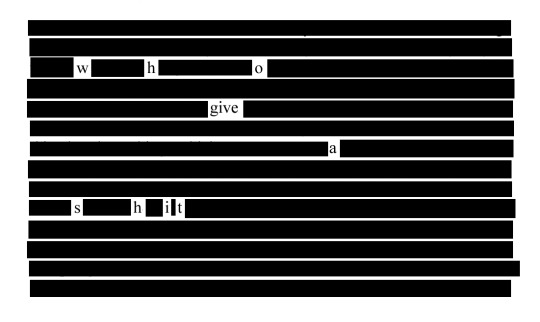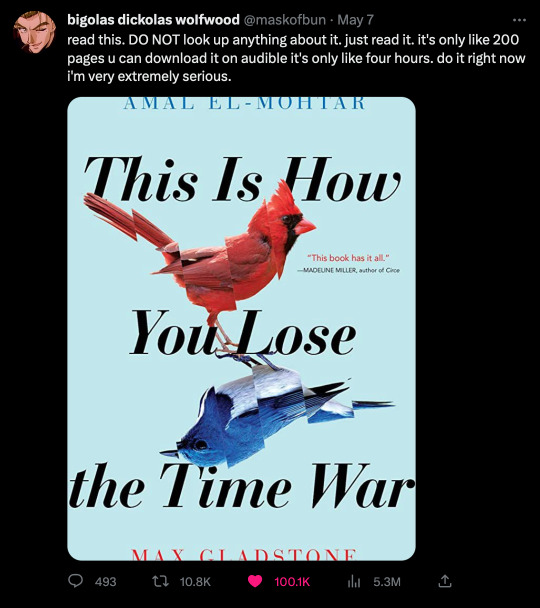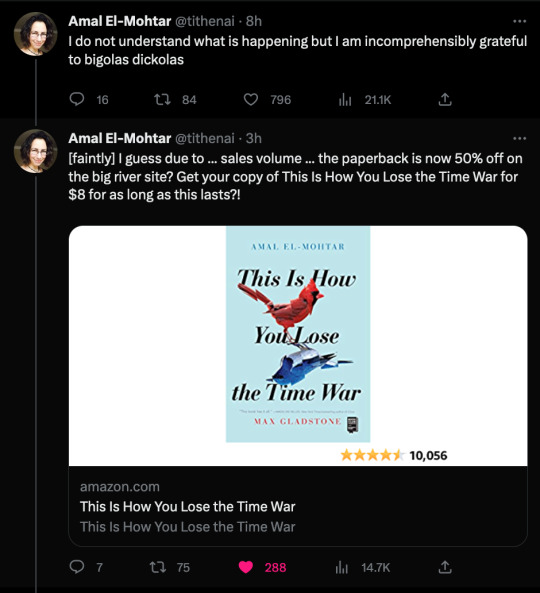#author posts
Explore tagged Tumblr posts
Text
Tag Finder
Welcome! Feel free to send me posts of your Genshin Impact OC for me to reblog on this post! No need to be shy!
OCs will be sorted for their element, weapon, region and/or stars.
Also, please, feel free to take a look at my own OC, Solomon!
#Anemo#Geo#Electro#Dendro#Hydro#Pyro#Cryo#Mondstadt#Liyue#Inazuma#Sumeru#Fontaine#Natlan#Snezhnaya#Sword#Bow#Catalyst#Claymore#Polearm#4*#5*#author posts#solomon
14 notes
·
View notes
Text
Some idiot: "Why are you reading your own fic, that's shallow and stupid"
All fanfic writers and writers everywhere: "Who the fuck do you think I wrote it for?!"
#writer things#fact#writers on tumblr#writeblr#creative writing#writerscommunity#writing community#ao3 writer#writers and poets#write#writers#writer#writers on writing#writerslife#ao3#fanfic#fanfic writers#authors#wayward rants#wayward rambles#shit post
34K notes
·
View notes
Text
"people who stay up at night are either insomniac or In love" people who stay up at night read gay fanfiction on AO3 what are you on about?
#source: my brain#i think you get what i want to say with this post cuz i cant seem to word it right#ao3#lyra talks abt stuff :3#fanfiction#fan fiction#fanfics#fanfic#ao3 fanfic#fanfic authors#fanfic meme#archiveofourown#archive of our own
35K notes
·
View notes
Text
author’s notes today: hey guys so just a warning there isn’t 100% explicit verbal consent even though they’re both really into it so remember this is FICTION, also they don’t use a condom :((( but in real life safe sex is important!!! please be safe out there everyone
a/n back in the day: kept thinking about ____ stabbing knives through both of _____’s hands to pin him in place while they fucked so here you go lol =P
#i’m not saying it was better at all! i just find the contrast hilarious#no one posted stories with the belief that readers would use them as instruction manuals#kids today write author’s notes like they’re about to be sued for practicing without a license
38K notes
·
View notes
Text
No one tells you when you get a Big Serious Job™ how many fucking abbreviations you’ll be forced to learn.
#or how many abbreviations that you’ll come across that mean something different from what you’ve always known#I stopped reading a requisition to make this post because I read a sentence that was like#‘something something the COR and the contractor POC’#and I stopped like ‘contractor person of color???’ before remembering Point of Contract#also no one at my job tells you what any of this stuff means. they’re just like Morgan can you take care of this DOA?’#and I gotta sit there like Dead on Arrival??? before figuring out it’s a Delegation of Authority spreadsheet
43K notes
·
View notes
Text
People against piracy fail to realize that no, I can’t just ‘buy it.’ They stopped making DVDs and Blu-Rays. They’re barely offering digital copies for download. I am not spending money I could use for food or bills to pay for a subscription service just so I can always have access to a beloved piece of media. Especially not when the service will remove media on a whim without concern for how the loss of access to that piece will make its artistic conservation nigh impossible.
For example, I recently learned that Disney+ had an original film called Crater. It’s scifi, family friendly, and seems cool - I would love to buy it as a holiday gift for my little brother! But: it’s exclusive to D+ and THEY REMOVED IT LITERALLY MONTHS AFTER ITS RELEASE.
The ONLY way I can directly access this film is through piracy. The ONLY available ‘copies’ of this film are hosted on piracy websites. Disney will NEVER release it in theaters, or as something to buy, and it may NEVER return to the streaming service. It will be LOST because we aren’t allowed to purchase it for personal viewing. If I can’t pay to own it, I won’t pay for the privilege of losing it when corporate decides to put it in a vault.
So yes, I’m going to pirate and support piracy.
Edit: if you are able, use $5 you would otherwise use for a streaming subscription to donate to a GazaFunds campaign.
#edit: go to https://gazafunds.org/ and donate $5 you would otherwise spend on streaming services on a campaign!#ra speaks#piracy#media piracy#pirate to make hondo ohnaka proud#obligatory ‘don’t fucking pirate small authors/artists works wtf dude’ statement.#anyone who’s seen my media bitching before knows I’m a hype man for indie films this ain’t about them#this is about corporate streaming services killing physical media bc sales numbers are less impressive than number of streams#edit: USAmericans stop telling me to buy DVDs and blurays at Walmart. think outside your borders for a hot sec. fun thought exercise.#your experiences are not universal#edit: WHO GOT THIS TO 100k. I JUST WANT TO TALK (this post is my second to hit 100k woahg.)#in other news: fix your fucking posture. drink some fucking water. and go the fuck to bed if it’s late bc it’s for me rn. peace and light.
135K notes
·
View notes
Text


Translated with permission!!
Here's the author's Twitter (achu_0u0) and the original post!
Note from author: Wouldn't it be hard for half-foots to go to the movie theater?
#i messed up the lining and text size a bit but shh#i plan on translating all of their dungeon meshi fancomics... sometime#first time translating anything ahhhh!#don't ask why fler is asking mei for the popcorn when puck has it#sibling thing#this took me like 6 hours btw#mostly stressing over the typesetting#i made it on a tablet with an “add text” app that doesn't let you align the text or anything#it was driving me crazy#anyways check out the author they have amazing chilchuck fanart and fancomics!#in korean though#dungeon meshi#delicious in dungeon#chilchuck tims#puckpatti chils#flertom chils#meijack chils#katrina posts#translations#achu_0u0
12K notes
·
View notes
Text
So writers joke a lot about "drinking the tears of our readers", but I want to be so honest with you when I tell you that making you cry isn't our real goal. Making you feel is.
Kicking your feet? Giggling? Can't stop smiling? And yes, crying? Feeling anything, everything. That's our goal. That means we did The Job.
#indie author#indie books#indie writer#lgbt author#lgbt writers#lgbt books#lgbtqia books#lgbt reads#queer writers#queer booklr#female writers#women writers#writer#writers on tumblr#writing#writeblr#writerscommunity#writer problems#writer post
8K notes
·
View notes
Text
“how do you plot / plan your book?” very bold of you to assume i do that.
#i literally just make it up as i go!!#oh what happens next? I DON’T KNOW!!#writing#writer#creative writing#author#writers on tumblr#story writing#author things#writeblr#writer stuff#book writing#bookblr#writing advice#writing prompt#on writing#writers#writer things#writers and poets#writerscommunity#writblr#female writers#author blog#author post#writing community#writing is my therapy#writing blog#writer problems#writing on tumblr
10K notes
·
View notes
Text

meditations on first philosophy (1641) - rene descartes
"who give a shit"
#rene descartes#ok#so this is a reference to that post#bc i cant stop saying it#sorry i havent been active#ive been working on an opera#and have been having like p bad health issues#but its ok#learning to crochet a minecraft frog#idk if itll be like any good#whatever life is love anyway#blackout poem#blackout poetry#author#book#poetry
63K notes
·
View notes
Note
Do y'all have a genshin oc discord server? And if so is it big/busy?
I do, and it's pretty active! If you want to join us, the link is here:
https://www.tumblr.com/wepostcringe/729675297600978944/yaayy-genshin-impact-discord-server
2 notes
·
View notes
Text
"A story doesn't need a theme in order to be good" I'm only saying this once but a theme isn't some secret coded message an author weaves into a piece so that your English teacher can talk about Death or Family. A theme is a summary of an idea in the work. If the story is "Susan went grocery shopping and saw a weird bird" then it might have themes like 'birds don't belong in grocery stores' or 'nature is interesting and worth paying attention to' or 'small things can be worth hearing about.' Those could be the themes of the work. It doesn't matter if the author intended them or not, because reading is collaborative and the text gets its meaning from the reader (this is what "death of the author" means).
Every work has themes in it, and not just the ones your teachers made you read in high school. Stories that are bad or clearly not intended to have deep messages still have themes. It is inherent in being a story. All stories have themes, even if those themes are shallow, because stories are sentences connected together for the purpose of expressing ideas, and ideas are all that themes are.
#original post#text post#500#1k#2k#btw i know my definition of death of the author is loosey goosey here#it wasn't the main point so i went informal with it! as ppl in the tags have pointed out it isn't exact#and i do recommend reading the wikipedia article or similar (possibly even the essay itself if you're narsty) if you want to learn more!#wasn't expecting this to take off so my apologies to my barthes-heads out there#love you mwah#5k#10k#15k#20k
30K notes
·
View notes
Photo






So, a funny thing happened on trigun twitter
(amazon link where its 50% off as of May 8th: https://www.amazon.com/This-How-You-Lose-Time/dp/1534430997/)
(more up to date version here because holy fuck did this escalate)
#this is how you lose the time war#trigun#how tf do i tag this post#twitter posts#funny#images#if this is how a hugo author gets into trigun i will break a kidney laughing#tagging as trigun because bigolas dickolas wolfwood is a primarily trigun account#and for the vash pic ig
82K notes
·
View notes
Text
Guys.. Stan canonically writes fanfiction, presumably posting it to ao3.. I bet that man has got the ultimate author's curse notes
"Sorry I'm late to update guys! Got arrested by the federal government for stealing materials from them to rebuild an interdimensional portal to save my long lost twin brother! But hopefully things will be more consistent now that I'm done saving him!"
"My bad for this being so rushed, currently living through the literal apacolypse!"
"Didn't mean for this too take so long y'all, had to reread the whole fic to refresh my memory after getting my brain wiped to kill the demon who used to date my brother, y'all know how it is!"
#like he is STRUGGLING#makes sense his ass is getting alll the curses#On the Stan'O'war'2 Ford has been desperately trying to track on anomoly but it keeps leading him in a literal circle#because the anomaly is Stan and his fanfic author curse#Ford realises this eventually and spends weeks studying Stan and trying to figure out how to break the curse#Stan is completely unbothered by all of it#gravity falls post#gravity falls fandom#gravity falls stan#gravity falls stanley#gravity falls stan pines#gravity falls grunkle stan#grunkle stan#stan pines#gf stanley#stanley pines#gravity falls#gravityfalls#gf fandom#ao3#ao3 writers curse#ao3 author curse#stanely pines#gf tag#gf#gravity falls tag#gf stan#gf grunkle stan#rye rambles
4K notes
·
View notes
Text
does anyone know wtf word-stream.com is or where to send them a takedown request? i just found a bunch of fics, including my own, hosted on this AI slop site—apparently offering what I assume are AI-generated audiobook versions & (equally AI-generated) ratings and reviews. i can’t take a closer look without signing up, which, no thank you, but it looks like they’re hosting the full fics and are peddling a paid subscription for the trouble of hosting them. can someone more knowledgeable than me explain what our options are in this situation?

#i’m not tagging everyone because tumblr tends to hide those posts#but sharing is very much appreciated!#and there are WAY more supercorp authors listed than shown in this screenshot alone#like i’m pretty sure we’re ALL there#supercorp fan fic#supergirl#AI plagiarism#word-stream#cliffweitzman
6K notes
·
View notes